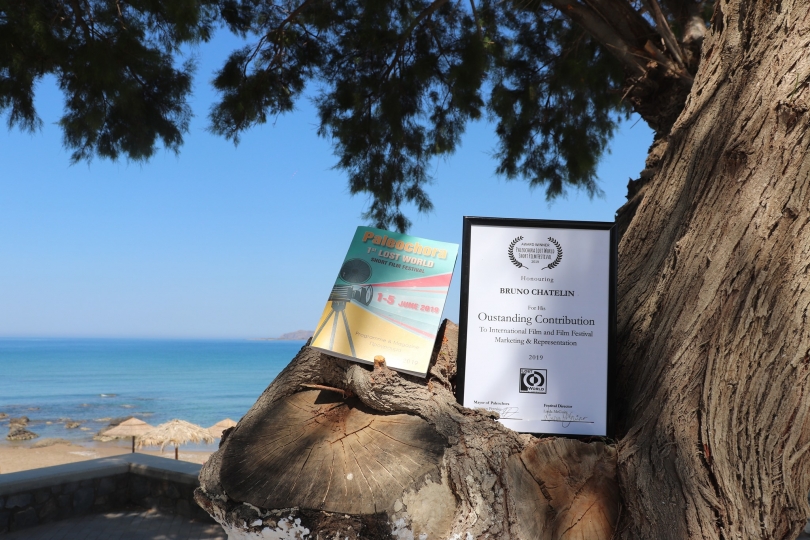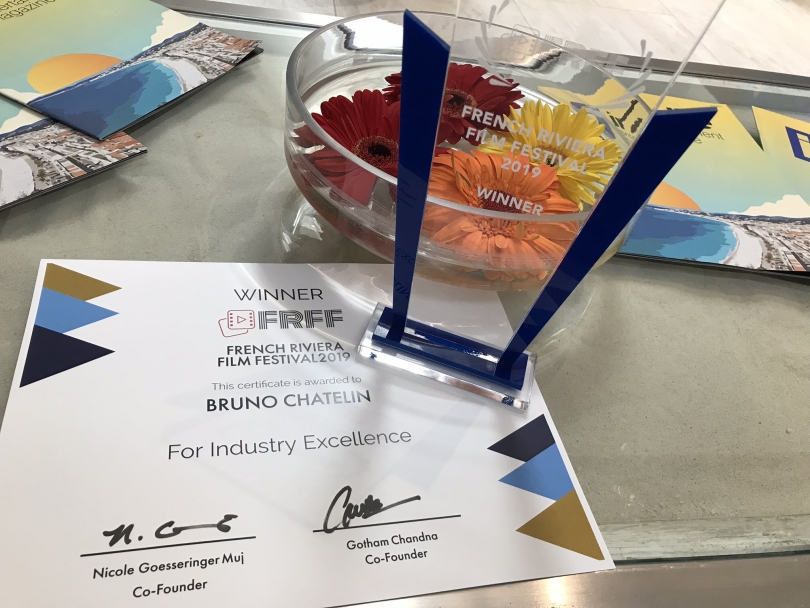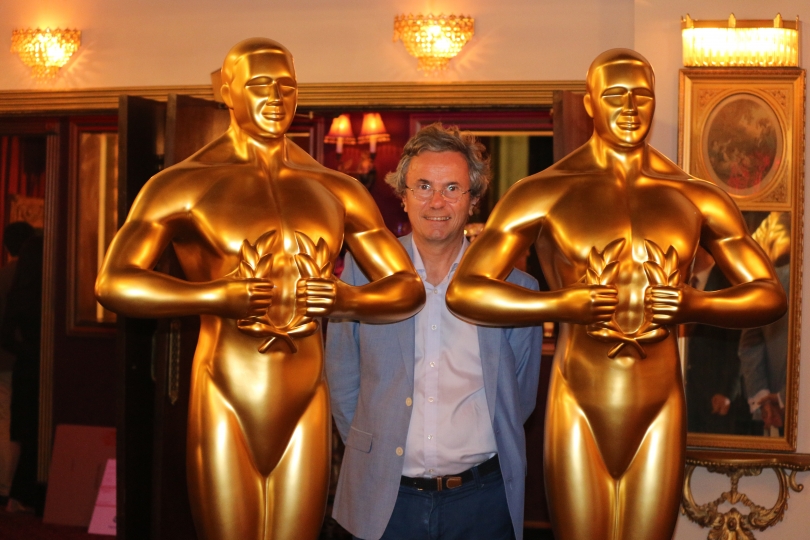From the same producers of City of God CONTRA TODOS (UP AGAINST THEM ALL)
A film by ROBERTO MOREIRA
Showing in Panorama section
In a barren district on the outskirts of São Paulo we find Teodoro and his teenage daughter, Soninha, living with Claudia, Teodoro’s second wife. But the daily life of this low middle-class family is built upon lies. Behind a mask of religiosity, Teodoro makes a living as a hired gun, beats his rebellious daughter Soninha and has an affair with Terezinha, his church-going companion. Claudia, vain and unsatisfied with her marriage, has an affair with Julio, son of the neighborhood butcher. Orbiting about them is Waldomiro, Teodoro’s old friend and partner and Soninha’s object of desire. Things are triggered off by the murder of Julio. Blaming her husband, Claudia destroys the house and runs away. While at a small hotel in the center of town, she meets the desk clerk Lindoval, with whom she has an affair. Fed up, Teodoro decides to leave São Paulo, marry Terezinha and send Soninha to her grandmother’s house. But nothing goes as planned. When Lindoval is beat nearly to death by skinheads, Claudia suspects that it was her ex-husband. On the same night, someone delivers a video to Terezinha showing Teodoro having sex with Claudia. The hired killer thinks Claudia gave her the tape. The double mistake leads to the story’s shocking conclusion, interspersed with various revelations and a surprise ending.
Interview with the director
Up Against Them All is your first feature-length film. What is the theme behind the film?
The film endeavors to describe how violence disseminates within a family and ultimately leads to its destruction. It takes place in a district on the outskirts of São Paulo because of the critical situation found there: the presence of the State is almost null and violence has been completely incorporated into daily living. The film aspires to portray this process which denies the characters any opportunity to change. We are talking about the consequences of social segregation: living on the rim of society creates brutality and truculence. This hopelessness faced by the characters, at the mercy of cruel and turbid destinies, has revealed itself to be one of the thematic tendencies of contemporary Brazilian fiction.
Where does the plot come from?
From a need to talk about the violence on the outskirts of São Paulo. I have always been impressed with the fact that we have hired-guns living right next to us, in the same city. Working with the characters brought about the situations found in the film. What succession of events led up to the character? And what if he didn’t want to be a hired killer anymore? What is he like intimately? His family and affectionate life? It is hard to believe that it is harmonious. On the contrary, it must be harsh, full of conflicts. In the end, violence is not just another social statistic, but a way of life.
How did you decide on the title? Why didn’t you call the movie “God Against All”, the original idea?
Mario de Andrade coined the phrase “God against all” in Macunaíma. Joaquim Pedro de Andrade used it in his adaptation of the book and it was from this that Herzog got his idea for the subtitle of The Enigma of Kaspar Hauser: Every Man for Himself and God Against All. I removed “God” because I thought it inclined the film towards religious issues, which was not the idea.
How was Up Against them All filmed?
I opted in treating fiction as if it were a documentary. I wanted images I could believe in, something that would give spectators the impression that the scenes were purloined from reality. Because of this all cinematographic apparatus became a burden. I decided to work with just a few resources and bet more on the story and actors. We recorded digitally, with a crew of 15, lighting equipment was reduced to a minimum, all shots were filmed with the camera in hand, sound was adapted to documentary conditions, we didn’t use any studios and production design used objects which were already at or in the neighborhood of the scene.
At what stage in the process did it occur to you to film like this?
Multiple factors conspired positively towards it. For many years now I have been dissatisfied with traditional production means. One of the first movies filmed in video in Brazil was made by me in 1993, O Cão Louco Mário Pedrosa, and I never worked with celluloid again after that. My preference for video is due to the agility you have when filming. You are less tied down to technical preparations and have more time to dedicate to the actors and directing itself.
Are these political or aesthetical choices?
I don’t think it’s possible to separate the two. I wanted an incisive, emphatic, harsh tone. Something capable of involving the spectator and which he could not remain indifferent to. This refusal of using technical apparatus and “professional” habits had already been introduced in a few neo-realistic films, then later taken up again by the nouvelle vague, Brazilian Cinema Novo (New Cinema) and, more recently by filmmakers from the Dogma movement. It seems that from time to time movies have to rid themselves of the immense amount of odds and ends which inhibit the freshness of its images.
What kind of language were you looking for in the movie?
A hyper-realistic, natural like, raw, direct, clean, true to life... Basically, that it be the contrary to the artificial and false intonation found in a major part of contemporary cinematographic productions. We have always had a thespian tradition inclined to exaggeration, be it in the good or bad films. Ismail Xavier said that City of God established a new standard of verisimilitude for Brazilian cinematography. We now have to maintain and consolidate this conquest.
Did recording in DV contribute to this?
The advantage of DV is that it purges the production process and allows for efforts to be concentrated on actors and situations. It means putting all the paraphernalia to the side and search out reality. But it takes more than just changing the support. The whole process has to be re-thought. What is more important for your film: beautiful images or convincing actors? A realistic tone or a more artificial one? There is no doubt that if the world were perfect and we had unlimited budgets, the best would be to have the two at the same time. But that is not our reality. A director can spend years putting together production money and when he is filming finds himself obliged to submit to all types of concessions to be able to finish the movie. The result is that many times a movie might have beautiful images but badly constructed characters, scenes without any kind of dramatic curve and full of artificial situations.
How did you find the locations? Were the surroundings used in the film as well?
The neighborhood where we filmed is very diverse and full of different urban settings. Our choice of filming on the East Side was important because we didn’t want a cliché-like third world suburb, full of kids, music and noise. I think the movie has a real São Paulo “feeling” and choosing the right locations helped us create this sensation.
What was it like filming externals, like the Grandes Galerias?
We filmed in the Grandes Galerias on a very busy Saturday. What surprised us was that almost no one looked at the camera! We didn’t have to hide it, as today people think video cameras are something normal. We wandered through the mall for hours. The crowds of shoppers are great for spontaneous extras.
The process for preparing the actors was different than the usual. Could you say something about this?
The actors agreed to participate in the film without first reading the screenplay and during the rehearsals they came into contact and lived the story. At the end of this process they had literally incorporated their characters. Only then did we give them the screenplay, without the dialogues, so all the scenes and lines in the film were improvised during the filming. The experience gained from the films O Invasor, Bicho de Sete Cabeças and City of God were fundamental to be able to use this option of improvisation. I radicalized on an idea they had already worked on.
How was Sérgio Penna important in constructing the film?
Sergio, who prepared the actors, was fundamental in the process of deepening the understanding of the characters and their individual dramas. Although I have been re-writing this screenplay for years, during the preparation of the actors I discovered unexpected aspects of the story. Each actor was completely free to create the motivations behind his character and in this process they invented five different scripts. This richness of view points helped make the film more complex and add other nuances.
What difference does this empathy of the actors and crew make in the creation of the film?
One of the problems while making a movie is to avoid that each member of the crew makes a different movie. The finished product becomes bureaucratic and disperse, as if the different parts did not fit together. The working environment also becomes heavy and tiresome which reflects in the film. Making movies is team work and the director’s vanity only gets in the way.
What does the director gain by assenting to concessions in his ideal film, as you say, which he has in his head?
Freedom. You no longer chase after an illusion and you dedicate your time to what you have in hand. You can then make new discoveries, valorize nonintentional results and incorporate suggestions from the crew. I radically changed the structure of the film in editing it. Why should I insist in something which is not working? My first commitment is to the quality of results.
How did O2 Filmes get involved in the movie?
I liked City of God very much. I think it is a rare example of a quality Brazilian production. Everything works: director, actors, screenplay, production. So I invited Fernando to see my film. It is very hard to judge the results of your own work and I was looking for some feedback from someone who hadn’t read the screenplay and who I could trust. Fernando not only liked the movie but got O2 involved as well. I was very happy because I think we share the same ideas about cinema.
What are the expectations for the film’s presentation at the Berlin Festival?
Berlin is the first big festival of the year and one which presents only a few carefully selected films. These two factors make the festival an excellent showcase. My expectations are that the film be invited to other festivals, which could help to launch the film in Brazil.
Is Up Against Them All the first major release of Coração da Selva? What is the work philosophy of the production house?
Coração da Selva was created for developing projects able to articulate cinema, technology and media in original manners. We believe that production models have to be transformed and that new formats for programs and movies have to be found. Our next project is Antônia, a feature-length film by Tata Amaral which takes place in the universe of Rap.
How do you intend working towards the “consolidation of a circle of virtues” between the film and its public?
I sincerely think that the film has box office potential. I tried to make an exciting movie capable of grabbing the spectator’s interest. The challenge now is to find a good launching strategy. We will first participate in the festival circuit and try to mobilize opinion makers. After this we will have regional releases, working each locality individually. And the rest is hard to define: is word of mouth going to be efficient? Is the allocated time for launching going to be sufficient?
Do you defend the idea of movies with targeted publics?
Yes I do. To finish the editing of the film I gave various informal viewing sessions with friends who had not read the screenplay. I was looking for weaknesses and parts hard to be understood. We didn’t have the money for more systematic research, which I would not hesitate in doing if I did. A film takes years to be produced and in the end it is very hard to understand the results attained to. This feedback is fundamental. This does not mean that I did everything I was told to do, but all decisions were made after a lot of discussion. Cinema also has a communicative dimension which should not be disregarded. You need to respect the spectator and try to establish some kind of dialogue.
Do you believe that cinema from “developed countries” has a social or political role? What is this role?
I think that all forms of expression have political roles. Even the most abstruse lyrical poem reveals a posture, the author’s attitude in relation to the world. In the case of cinema I think we have to propose new experiences to spectators. They need to have access to realities they are not aware of. I think that cinema’s function is that of broadening the public’s horizons, to respond to hidden anxieties that have not yet been formulated. Cinema to me has to be in the vanguard, opening unforeseen windows into reality.

 Chatelin Bruno
Chatelin Bruno 




























